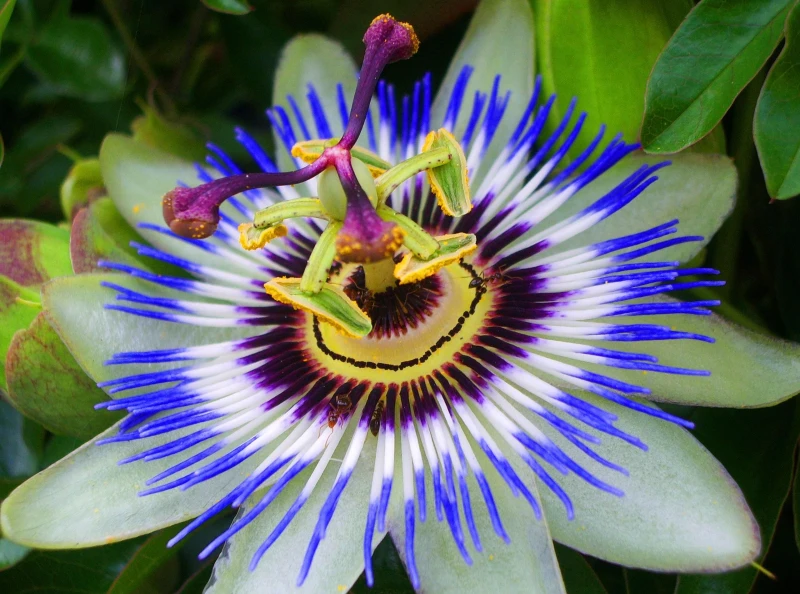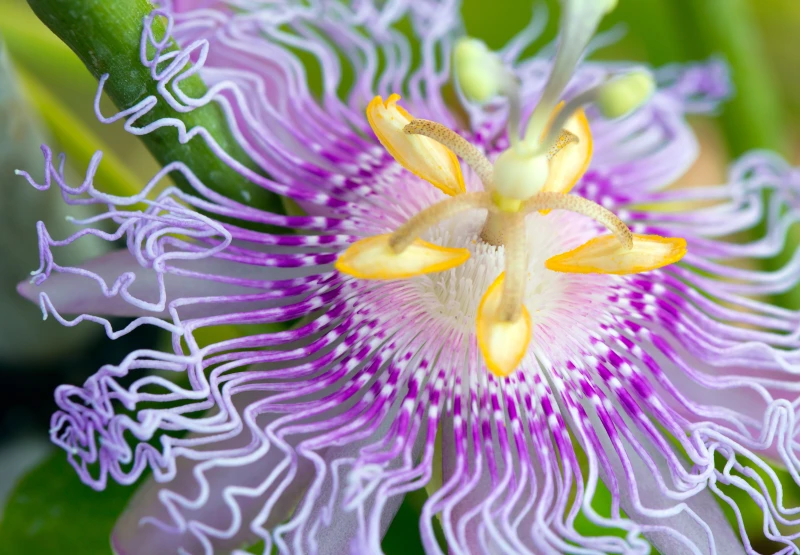Passion flower, also known as Passiflora, is a type of flowering plant with over 500 species belonging to the Passifloraceae family. This plant is popular because of its unique appearance and various benefits it offers. In this article with Impeccable Nest, we will discuss the meaning, uses, and benefits of passion flower.
What is Passion Flower?
Passion flower is a type of climbing vine that produces beautiful and intricate flowers. These flowers come in different colors such as purple, pink, blue, and white. They have five petals and several stamens that give them a unique appearance. Passion flower is native to South America, but it can now be found in different parts of the world, including Asia, Australia, and North America.
Uses and Benefits of Passion Flower

The Medicinal Properties of Passion Flower
Passion flower has been used for centuries for its medicinal properties. It contains natural compounds like flavonoids, alkaloids, and coumarins that make it effective in treating various health conditions. Some of the common health benefits of passion flower include:
- Reducing Anxiety: Passion flower has calming effects on the body, making it an effective remedy for anxiety, nervousness, and insomnia. It can help relax the mind and promote better sleep quality.
- Relieving Pain: Passion flower contains compounds that have analgesic effects, making it useful in relieving pain caused by headaches, menstrual cramps, and muscle tension.
- Lowering Blood Pressure: The natural compounds found in passion flower are believed to reduce blood pressure levels, making it helpful for people with hypertension.
- Treating Respiratory Problems: Passion flower has antispasmodic properties that help soothe respiratory problems such as coughs, asthma, and bronchitis.
- Boosting Immune System: Passion flower has antioxidant properties that can help strengthen the immune system and protect against free radicals.
The Culinary Uses of Passion Flower
In addition to its medicinal benefits, passion flower is also used in cooking. Its flowers and fruits are edible and have a unique flavor that can be used to enhance the taste of various dishes. Some of the culinary uses of passion flower include:
- Making Tea: Passion flower tea is a popular beverage that has a soothing effect on the body. It is made by steeping the leaves and flowers of the plant in hot water.
- Adding Flavor to Foods: Passion flower can be used to add flavor to different types of foods such as desserts, salads, and drinks.
- Making Jams and Jellies: Passion fruit can be used to make jams and jellies that have a sweet and tangy flavor.
Pros and Cons of Using Passion Flower
Like any other natural remedy, passion flower has its pros and cons. Here are some advantages and disadvantages of using this plant:
Pros
- It is a natural remedy with no known side effects when used in recommended doses.
- It has a wide range of applications in both traditional medicine and cooking.
- It can be easily grown at home, making it a cost-effective way to enjoy its benefits.
Cons
- It may interact with certain medications such as sedatives, anticoagulants, and antidepressants.
- It may cause drowsiness, especially when taken in large amounts.
- Pregnant and breastfeeding women should avoid using passion flower as it may cause complications.
How to Use Passion Flower

Passion flower can be used in different forms depending on the desired outcome. Here are some ways to use passion flower:
- Tea: Steep 1-2 teaspoons of dried passion flower leaves or flowers in hot water for 10-15 minutes. Drink the tea before bedtime to promote relaxation and better sleep.
- Tincture: Take 30-60 drops of passion flower tincture mixed with water, three times a day to reduce anxiety.
- Capsules: Take 400-500 mg of passion flower capsules, two to three times daily to relieve symptoms of anxiety.
- Topical Ointment: Apply passion flower ointment to the affected area to relieve pain caused by muscle tension.
The Best Alternatives to Passion Flower
If you are unable to use passion flower due to allergies, pregnancy or if it simply doesn’t work for you, there are some alternatives to consider. Here are some of the best alternatives to passion flower:
- Lavender: Similar to passion flower, lavender has relaxing effects on the body and can help reduce anxiety and stress.
- Valerian Root: Valerian root is another natural remedy that can help reduce anxiety and promote better sleep.
- Chamomile: Chamomile has calming properties that can help reduce anxiety and improve sleep quality.
Tips for Using Passion Flower Safely
To avoid any potential side effects when using passion flower, hereare some tips to keep in mind:
- Always follow the recommended dosage as specified on the label or by your healthcare provider.
- Do not take passion flower if you are pregnant or breastfeeding without consulting your doctor.
- Avoid using passion flower if you are taking medications that may interact with it.
- If you experience any adverse reactions such as dizziness, nausea, or vomiting, stop using passion flower and consult your doctor.
- Only purchase passion flower products from reputable sources to ensure safety and quality.
Step-by-Step Guide to Growing Passion Flower
If you want to enjoy the benefits of passion flower right in your own backyard, here is a step-by-step guide to growing passion flower:
- Choose a location that receives full sunlight or partial shade.
- Prepare the soil by mixing in organic matter such as compost or manure.
- Plant the passion flower seeds or seedlings at a depth of ¼ inch in the soil.
- Water the plant regularly but avoid overwatering as this can lead to root rot.
- Train the vines to climb a trellis or support structure to encourage upward growth.
- Prune the plant during the spring or fall to control its size and shape.
- Harvest the passion fruit when they turn yellow or purple and feel slightly soft to the touch.
Comparing Passion Flower Products
Passion flower products come in different forms and brands. Here is a comparison of some of the most popular ones:
| Product Name | Form | Dosage | Price |
|---|---|---|---|
| Nature’s Way | Capsules | 2 capsules, twice daily | $10.99 |
| Herb Pharm | Tincture | 30-60 drops, three times daily | $13.00 |
| Traditional Medicinals | Tea Bags | 1-2 tea bags, steeped in hot water for 10-15 minutes | $5.49 |
Conclusion
Passion flower is a unique and versatile plant with many benefits. It has been used for centuries for its medicinal properties and can also be used in cooking. While it is generally safe, it is important to use it correctly and follow the recommended dosage. Whether you decide to grow your own passion flower or purchase products, make sure to choose reputable sources to ensure quality and safety.

Hey there! I am Salena Snyde, a dream psychologist with over 10 years of experience. I am the primary author of the Dream Meanings section on Impeccable Nest, where I not only share in-depth knowledge about the nature, function, and significance of dreams but also connect with readers through profound articles and quality information. With passion and a diverse knowledge of dreams, I have established strong connections with dream experts worldwide by reading articles and studying leading books on the subject. I believe that the combination of personal insights and sharing from the dream expert community can provide the most profound and comprehensive understanding for everyone.
